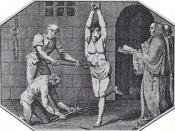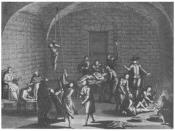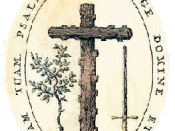Consequences of the Spanish Inquisition
Influenced by the Roman Inquisition, the Spanish Inquisition started in the late 1480s in order to promote Roman Catholicism. It was initiated in hopes of "purifying" Spain by eliminating threats to Roman Catholicism in order to unify the state religiously and other reasons. Once tolerated, Jews, Muslims, and other non-believers, and also other heretics were removed by unimaginable ways of torture. As an era of paranoia, torture, and death, this was one of Spain's darkest times.
As more and more paranoia and fear spread, the Inquisition was spread to other countries and cities and chaos ensued. Jews were not the only ones targeted; any non-Catholics and other heretics were put to death. Thomas de Torquemada was a general of the Inquisition and created the policy of the Spanish Inquisition. He was also responsible for creating branches of the Inquisition in different cities and countries.
The Inquisition spread to Spanish and Portuguese colonies in the New World as many Jews and Conversos fled there seeking security and economic opportunities. Branches of the Portuguese Inquisition were set also up in Goa and Brazil, as well as Mexico, the Philippine Islands, Guatemala, Peru, New Granada, the Canary Islands and other places in Asia.
Trials were used to control non-Catholics as well as people who performed other offenses, such as witchcraft, blasphemy, etc. Trials were used to try the accused and pass judgment. If the victim refused to testify, his or her guilt was automatically assumed. The Inquisitors needed to get a confession out of them. Torture was used to get a confession from the accused heretic. There were many types of torture used to force victims to talk. Torture ultimately permanently crippled victims, caused brain damage, and also mentally scarred them. Most people also died as a...


